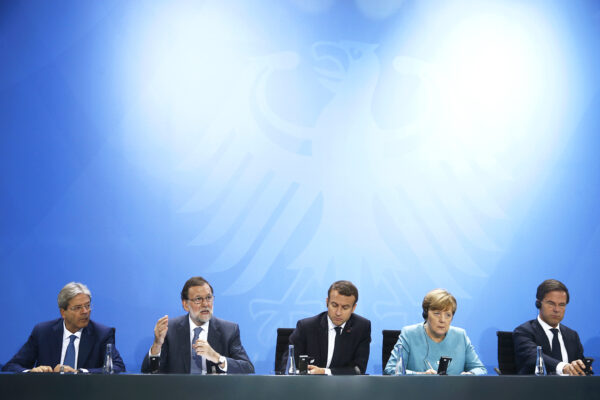
This week could be a make-or-break moment for the Atlantic alliance. Donald Trump’s unilateral withdrawal from the Iran nuclear deal has put European leaders on the spot.
- On Tuesday, the foreign ministers of France, Germany and the United Kingdom — the thee European countries in the agreement — meet with Mohammad Javad Zarif, their Iranian counterpart.
- On Wednesday, national leaders are due to discuss the issue over dinner on the eve of an EU summit in Sofia.
End of the alliance
Carl Bildt, the former foreign minister of Sweden, argues in The Washington Post that Trump’s threat to sanction European firms which continue doing business with Iran under the terms of the 2015 agreement is an assault on the sovereignty of European nations:
They are deprived of their right to decide on their policies and actions by brutal dictates from a foreign — and allegedly friendly — country. This is utterly unacceptable from a European point of view, as well as a violation of the preaching of Trump himself. It relegates Europe to just abiding by and implementing policies with which it profoundly disagrees.
James Traub goes so far as to declare the death of the Atlantic alliance, writing in Foreign Policy that Europe cannot afford to follow the American lead if the United States sow further chaos in the region:
As a simple matter of geographical proximity, Europe is threatened by conflict in the Middle East as the United States is not. The tidal wave of asylum seekers from Syria in 2015 upended European politics and exposed a popular vein of xenophobia and illiberalism that has thrown a terrible scare into European elites.
Now what?
Neither side has an incentive to widen the breach, argues Traub. But if the United States go ahead with sanctions, as well as the aluminum and steel tariffs Trump has announced, Europe could respond with measures of its own, leading to a trade war between the erstwhile partners.
Mark Schieritz argues in Die Zeit, a centrist German newspaper, that that is the only language Trump understands. His “America First” doctrine restores the law of the jungle of international relations.
Europe has challenged America on trade before. Leonid Bershidsky points out that when the United States imposed extraterritorial sanctions on Cuba in 1996, Europe found a way around them:
Europe’s stance on Cuba allowed European companies, such as Spain’s Sol Melia hotel group and France’s Altadis tobacco company, to remain major investors in Cuba.
The biggest European investments in Cuba were in the hundreds of millions of dollars. The potential for trade with Iran is much higher. The country has already attracted $7.4 billion in foreign investment since the nuclear deal was signed.
The Atlantic Council’s Mathew Burrows tells Axios there is another option: the EU could take the United States to the World Trade Organizations over sanctions and tariffs. The worry there is that Trump could simply ignore the WTO if it rules against him.
I think that could open the door much wider to economic nationalism and protectionism on the part of others.
